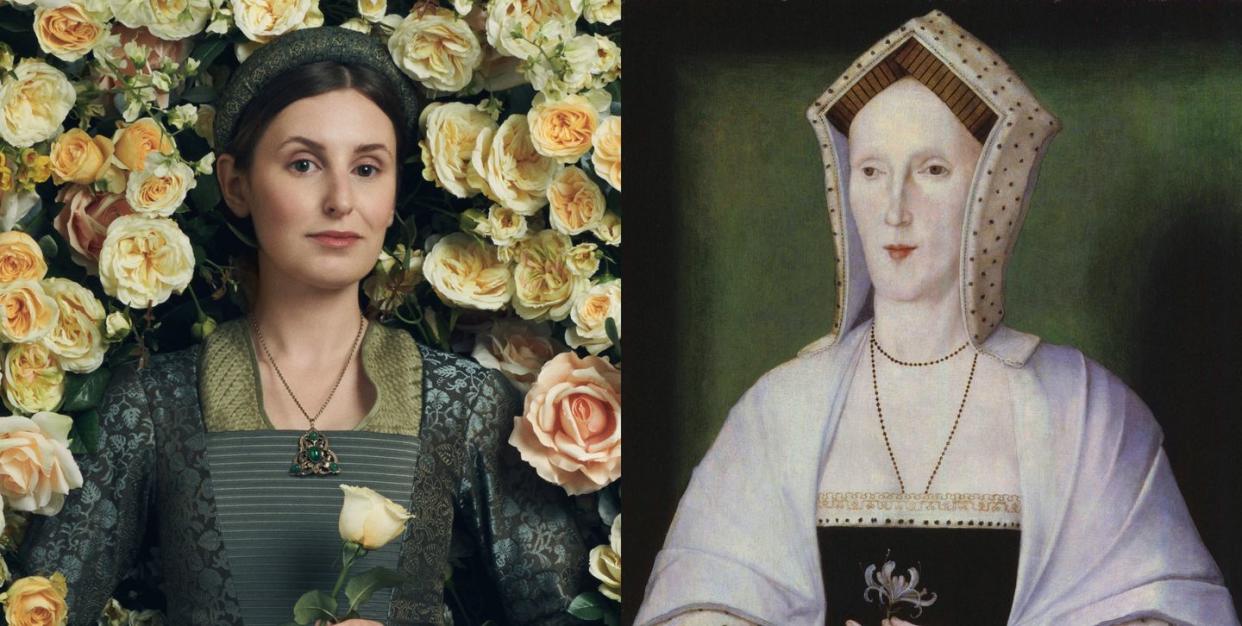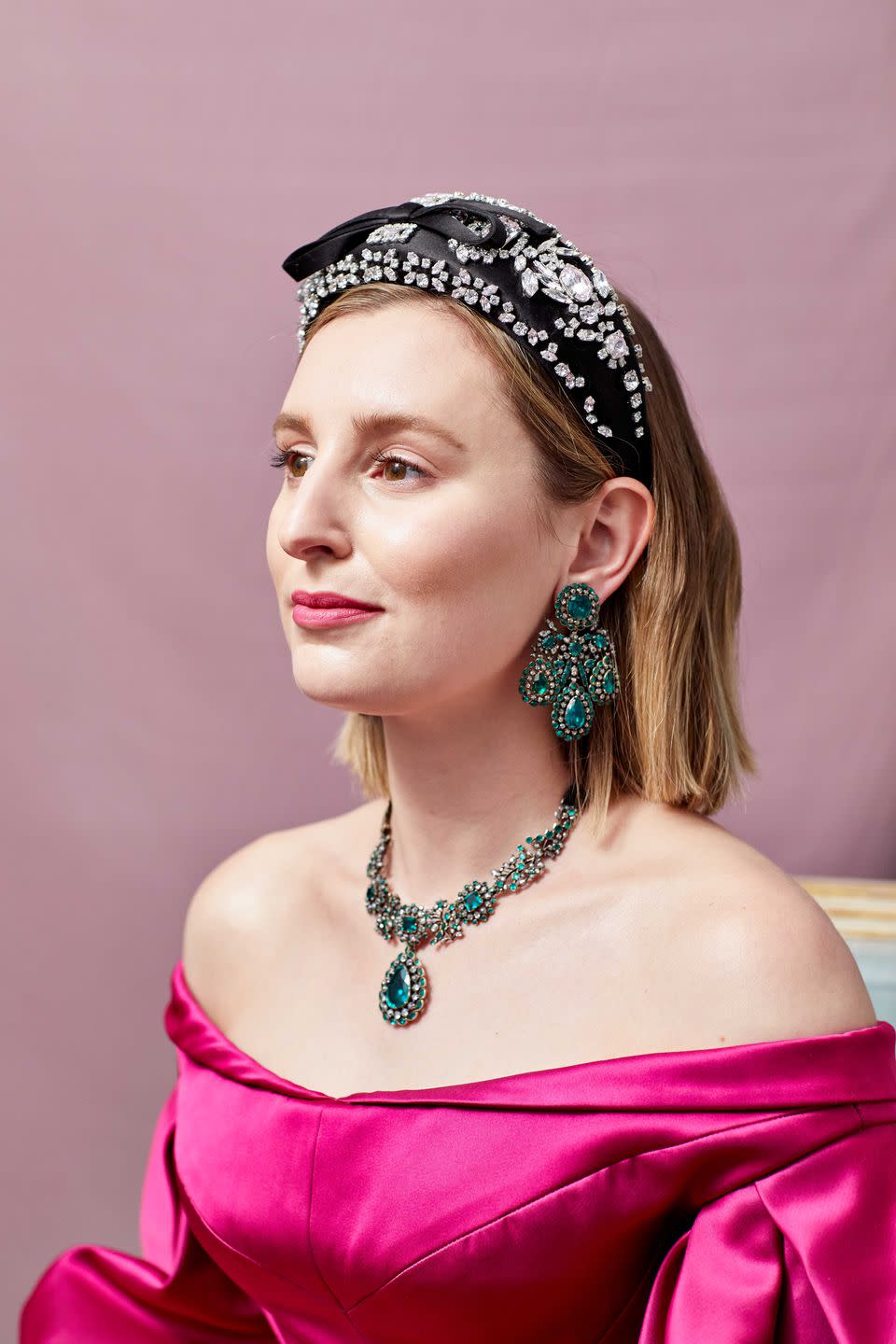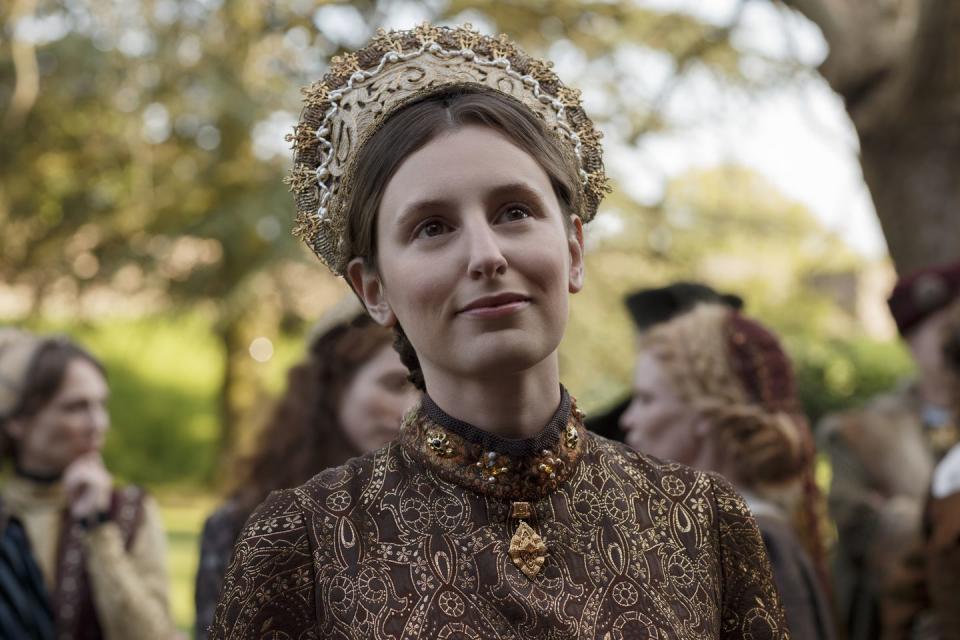Laura Carmichael on Why the World of 'The Spanish Princess' Is "So Much More Dangerous" Than 'Downton'

Laura Carmichael is no stranger to the romance of a period drama. As Downton Abbey’s Lady Edith, she willed us to root for the underdog middle sister (who, admittedly, wasn’t so nice in the early seasons), all while swanning about Highclere Castle and wearing gowns to family dinners with grandmother.
But her newest period piece, The Spanish Princess, a miniseries that debuts tonight on Starz, isn’t really about swoony romance. It’s about the hard-headed calculations that go into winning-and keeping-power. The show tells the story of Catherine of Aragon, Henry VIII’s first wife (yes, the one he divorced for Anne Bolyen), and her determined quest for the English crown, which took her through not one but two Princes of Wales.
Carmichael plays Margaret Pole, a Plantagenet who has married into the Tudor dynasty and thus has a rather tenuous place at court. She is a fiercely protective mother, fond of Prince Harry’s (the future king Henry) doomed older brother Arthur, but otherwise disgusted by the political games played at court by not only Catherine, but Henry’s grandmother Margaret and his mother Elizabeth.
Maggie, as Carmichael’s character is known, is “the moral barometer of the show," The Spanish Princess’s creator Emma Frost told Harper’s Bazaar. "I think Maggie is us in the situation: We kind of marvel at the Machiavellian infighting and this damage that everybody else does to each other. She has such moral sense and such a good soul."
T&C sat down with Carmichael to talk about playing history, the dangers of mothering in the 16th century, and what she can reveal about the Downton Abbey movie.
This is a period really marked by powerful kings and their powerful advisors, but this is a show about female power and ambition. I imagine that's something you all thought about a lot.
Absolutely. That’s a huge part of Philippa Gregory’s novels. [The series based on Gregory's books The Constant Princess and The King’s Curse.] That's what she's interested in and it's just sort of been built on with this show. Because you don't know these women’s stories. I felt like I only knew this period of history from Henry VIII, the divorcing and beheading and all the rest of it. So it's kind of an amazing thing to go back and see him as a teenager and young lover to this very powerful and strong female lead.

Is this period of history-the War of the Roses and the rise of the Tudors-more familiar to a British audience than it will be to an American one?
You know, I don't know that I have even the strongest grasp of the history that comes before Henry VIII, with the War of the Roses. It is an amazing story. But I think what’s important-and easy to understand-is that there was a different family on the throne. It was a different royal family and there was a war and now it's the Tudors.
And your character represents the casualties of that conflict.
Yes I'm playing this Plantagenet character who's been married into the Tudor family and she's got the feeling of having seen all of her family lost, killed. It's such a difficult position for Maggie because on the one hand she feels like her family should still be there. She would be having a completely different time if the Plantagenets were still on the throne. But also, she loves her husband. She's loyal to him. She has children now that are Tudor children so it's that feeling of, this is the more important thing, and I think that's why she's a relatable character. Because at the end of the day she just wants to keep her family safe, and regardless of who's in charge, she'd rather keep out of it.
There are so many ways that mothers and children are in peril in this show.
Absolutely. It was just a risky and dangerous time. Yes, the period is gorgeous and the costumes are glamorous but it's also the most dangerous place to be and that's really affected Maggie and certainly where she begins the story. She's thinking about Teddy [her brother, who was executed by the Tudors] when when she sees Catherine [of Aragon] for the first time.

Yes, and childbirth was incredibly dangerous too.
Absolutely. But I think that helps explain how they had to sort of keep going throughout it all and be very practical after Arthur dies and ends. Because they’re used it, to saying “right, where's the next. You know, you need multiples.”
What elements of history did you change for a modern audience or for the sake of television?
The ages are slightly squished because Catherine would have been there when Henry was much younger. And then they still married for 24 years so it's kind of mind boggling when you think of what you think you know about Henry VIII. But yes, that's truncated a bit. They really tried to kind of live off the amazing story, the real story, and be dramatic about it, what we imagine their character.
Why include Maggie Pole in this story-what does your character do to the narrative?
Well, she was there. She was a real life person who had this fascinating life. I think she's very different to Catherine. Catherine, throughout the story, is led by her desire to be Queen of England. She's tough and she's brutal and I think the thing for me that's interesting with Maggie, I can relate much more to her. Her position, which is that this is so completely dangerous and I want out of it. I want to be as far away as possible, living with my children in the countryside. And so I think she kind of brings a softness to the story, a maternal side. Catherine's a warrior and Maggie's this mother and she becomes tough as we go later into the episodes, she finds her voice but that’s not how it starts.

For me, she represents Englishness in this story, a contrast to this young Spanish princess.
Totally. And you see that in the kind of design of everything, the costumes, the hair. You see the difference between what it means to have grown up in the English court versus the Alhambra, where Catherine grew up.
How is this period different from playing the period in which Downton Abbey is set?
It's a weird thing because there were strengths that these women had in their lives that, if you had status, you could really affect the course of history. Obviously for only a few women, but that wasn’t really true for Lady Edith. So I think in that, it's completely different. This is a different world. It's romantic, still, but I think it's a lot darker in this story. It's so much more dangerous.
Is there anything that you can tell us about what is in store for Lady Edith in the upcoming Downton movie?
No. That’s just my short go-to answer because it's true. I haven't seen it yet. But it was lovely. Being there, watching Michelle become Mary again, you go, "Oh, I've missed you." It's really nice. Seeing Mary and Edith and everyone else is like seeing an old friend you haven’t seen in a very long time. I mean, I get emotional if I even hear the theme music.
('You Might Also Like',)

